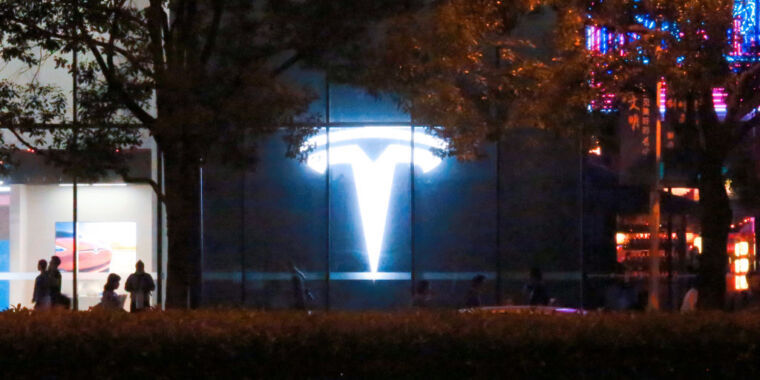Oh, cool, so that’s what’s supposed to happen in a collision? I’ll totally buy one.
“We would just like to stress that this isn’t typical.”
The front fell off.
How is it not typical?
Well, it’s not supposed to burst into flames upon hitting a tree, for a start.
Dude’s BAC was reported as 0.26 in a toxicology report. Autopilot makes mistakes, but you’re supposed to be sober enough to correct them.
As for the car bursting into flames when it was allegedly only going 41 mph, that is surprising.
2.6‰ for us Europeans btw, America uses %
0.26‰ would only be slightly drunk with minor impairments, with that BAC you should be able to correct most “autopilot” mistakes
That’s not how it works. .26 BAC is .26 g/100mL so it’s the exact same in Europe. A BAC of 2.6 is not possible as you’d die before ever getting to 1 . Also ‰ is literally just for one thousandths percentages.

In my European mind, a BAC of 0.26 refers to a BAC of 0.26‰ which is fairly low, due to the lack of units.
But it referred to a BAC of 2.6‰, which is extremely high.
.26 is very high in American units when .08 is legal limit in a lot of places! So whatever the higher option is, most likely for non American units.
I’m pretty sure they’re correct. 0.26 per cent is 2.6 per mille (thousand).
For per mile. For BAC, not so much as I said it’s g/100mL.
Awesome. They specifically mentioned what it would be in European units for their understanding. They weren’t talking to you directly.
Sure, but there’s no % there, it just say BAC.
When there’s no % or ‰ anywhere, people assume its in the unit that is most commonly associated with BAC readings in their country. Which in the EU, is ‰
Your local news would say a BAC of 0.26, their local news would say a BAC of 2.6
That’s still inaccurate, sort of. I did more digging and found that Europe does use percentages for BAC, however they also use gramms/Liter. So it’s still % but one decimal place off because of L vs 100mL. Though maybe some local places in Europe use per mile to get numbers like 2.6 . Unless they specifically are talking about US BAC and converting it to EU BAC.
https://etsc.eu/issues/drink-driving/blood-alcohol-content-bac-drink-driving-limits-across-europe/
Ahh, so the bursting into flames is a feature, not a bug.
I keep being told we shouldn’t talk about Teslas catching fire because it’s not a big problem and also other cars catch fire.
You can absolutely talk about it, but recognize that non-EVs catch fire more often that EVs. So if you have a problem with EVs catching fire, you should REALLY have a problem with every other car first.
How old is the EV fleet compared to the broader vehicle fleet? Literally some of the oldest “mass-market” EVs are barely older than the average car. I’ve never had a fire in any newer car, but I’ve had a couple of close calls in old shitboxes with rat gnawed wiring or an oil/fuel leak onto the exhaust headers.
I don’t have those numbers. I’d be happy to look at them if you find them though.
Can’t say what the average EV age is, but I know for a fact it’s far younger than the overall fleet average. Overall fleet average in the USA is 12.5 years, while the Leaf and Model S, some of the oldest “mass market” EVs didn’t begin sales until 2011 and 2012, respectively. The Model 3 and Y didn’t begin sales until 2017 and 2019. The average EV is much, much younger than the overall fleet, and only make up about 1% of the total US fleet.
Do other car companies’ cars that lack defects tend to have this sort of fire situation?
Do other car companies’ cars that lack defects tend to have this sort of fire situation?
If you can point to any car company that produces a car lacking defects at all, I’m very interested to see it. With regard to EV fires vs cars that have ICE the numbers are very telling:
“Data from the National Transportation Safety Board showed that EVs were involved in approximately 25 fires for every 100,000 sold. Comparatively, approximately 1,530 gasoline-powered vehicles and 3,475 hybrid vehicles were involved in fires for every 100,000 sold.” source
60 times greater fire chance for pure ICE car than EV. 139 times greater fire chance for hybrid than EV. So if you are desiring to own a car with a much much higher likelihood it will catch on fire make sure it has an ICE engine and a gas tank.
Now that is a better statistic. However, I would want to go one step further - every 100,000 vehicle miles.
In looking for other information I did run across this quote. Its in an article from Forbes, so take it with a grain of salt, but the quote isn’t from the author but from Tesla corporate. It doesn’t offer a complete picture, but its the closest to your question I’ve run across so far so I thought I’d share it:
“Tesla has reported that between 2012 and 2021 there was approximately one Tesla vehicle fire for every 210 million miles travelled. This includes fires that did not originate in the vehicle, like arson, structure fires etc. According to the National Fire Protection Association, the national average in the U.S. was one fire per 19 million miles travelled. This suggests Tesla’s EVs are 11 times less likely to catch fire than the average car,” Edmondson said." source
Dang yo, that’s exactly the number I was looking for. Thank you!
I’d be interested in that number too, but I don’t know how you can go about finding it.
Talk to Tesla. They claim this has nothing to do with defects. It’s not about likelihood, it’s about their claim that it’s not their issue.
Why do I need to talk to Tesla? BEVs (Tesla or any other brand) have far far fewer car fires than anything with an ICE engine. Its proven by statistics. You started this conversation asking about car fires. Isn’t that the topic you wanted to cover?
They claim this has nothing to do with defects.
You’re moving the goalposts on the conversation then. If I read the article properly, the “defects” comment in the suit was related to the crash, and not the fire, where the deceased driver and the surviving passenger both had Blood Alcohol Levels way above the legal limit. That wasn’t related to the fire.
Are you conceding on your original point and agreeing that BEVs are far far less likely to catch on fire than cars with an ICE engine and gas tank?
The average ICE is 4 times older than the average EV- more than 12 vs less than 4
139 times greater fire chance for hybrid than EV.
I feel like that’s mostly thanks to Kia & Hyundai…
Gas cars sometimes burst into flames when they crash into trees. Why is this news?
Lithon-ion batteries commonly used in electric vehicles. and are known to burst into flames when confronted with any force. Their are safety measures in EV’S. But sometimes these safety measures aren’t enough. Chances are that Tesla model 3 wasn’t defective.

I thought this article was going to be about my neighbor who’s kid died in a Tesla that hit a tree and exploded into a raging fire.
Wtf Tesla?
Self driving fucking when, I just want to sleep in my car while it takes me places
That is called public transport, my friend. You can sleep all you like on a bus or train.
The short sightedness of this kind of comment just to beat the thoughtless rhetoric without solving anything.
Self driving happens it’s better then the average driver. People start thinking ‘I shouldn’t leave my car idle I have to hustle, it can drive people while I am at work’. Self driving cars turn into ride share. Self driving cars then start becoming a norm, as investment takes over and they connect to each other driving and braking together. Accidents reduce, costs of transport lower. Fewer people buy cars. Cars work like carriages together like a train but using existing road infrastructure. Programmed by logic based on law pedestrians and bicycles now priority but anyone else can still take a clean private carriage to their destination.
This is what you want.
I am totally on board with individual vehicles as a last-mile solution, and self driving vehicles are a great option for that, but expecting them to provide the entire trip puts us right back in the situation we find ourselves now with human driven cars.
Unless we are going to shrink these vehicles down to the size of a bicycle, mass transit for the bulk of the route will always win out in terms of efficiency.
Yeah ultimatums like what you say are definitely the way to achieve this.
That’s not true, I missed my stop a couple of times because I slept
It wasn’t defective. Catching on fire is just normal behaviour for a Tesla.
Removed by mod
It was a successful test of the drive termination system.






